#whenever i think of the trio i always get flashbacks of their youth just like i do when i see satosugu and shoko
Explore tagged Tumblr posts
Text
[jjk spoilers] if i have to see this, you guys have to see it too


#whenever i think of the trio i always get flashbacks of their youth just like i do when i see satosugu and shoko#like the contrast between the first eps of season 2 and the shit thats going on rn feels so far away#just kill off everyone atp because why not#im looking at u gege#make everyone die including yuji so i at least know they're together again (but dead)#jjk#jujutsu kaisen#jjk spoilers#yuji#yuji itadori#megumi#megumi fushiguro
23 notes
·
View notes
Note
Who was your favourite character from the shows that aired during this recent season (January - March 2019)?
I’d have to say that it would be Isabella from The Promised Neverland. While researching how well she was received, I came across Mother’s Basement’s video on YouTube over here for how he viewed Isabella, and I found that we shared many of the same opinions on her, so check out his video because it really helped me to articulate various of the following points.
She was such a good antagonist because her mere presence was just so… dominating. She was compelling in a way that few characters are, because she was able to constantly evoke feelings of concern, uncertainty, and to a certain degree, even futility with regards to the kids’ chances of success. However, most importantly, she added a constant sense of tension to the show, which was vital in determining how great of a character she truly was, because whenever she was in view, whenever she was even talked about, Isabella gave the scene a “what’s going to happen” element to it. She kept you on your toes, kept you guessing, and that’s what I loved about her so much. She was remarkably insidious with her actions and mannerisms, and this made her so captivating - Because even when she was in the background of the scene, Isabella just had this way of silently looming over everything that was going on, consistently reminding the kids and the viewers that she is always there, always watching, and would always be a threat. This was one one of the factors which contributed to her overall portrayal as such a truly intimidating force.
She didn’t need to be in focus during the scene in order to impose herself, and she certainly didn’t need to say anything in order to convey how fearsome she was - She could just be playing with the kids like any other normal day, and then she would flash that sinister grin, which always spoke a thousand words:
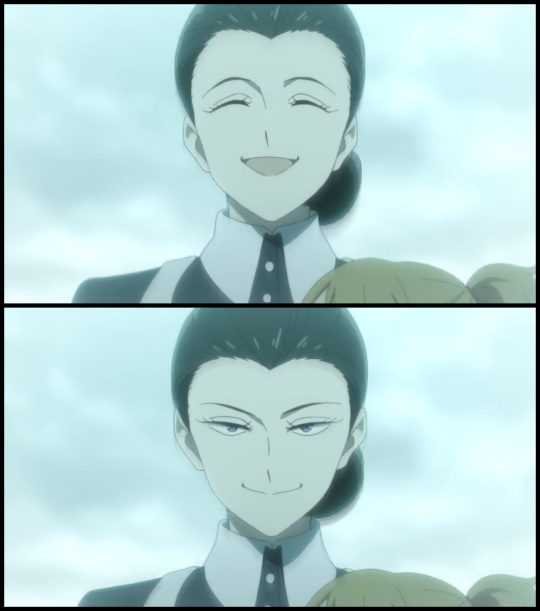
Isabella always carried herself with this aura of untouchable confidence which just screamed “you can’t win”, and this was very explicitly communicated in her grin above. She was always depicted in a way that made it seem as though getting the better of her was a near impossible task, because she always seemed to be at least three steps ahead, every single time.
Yet, that only scratches the surface of what made her so captivating as the series’ main antagonist. Despite her calm demeanour and her smiley nature with the kids, this didn’t prevent her from being scary, because there were times when she was scary. The expression that she wore at the very end of the first episode was one of the most memorable shots in the entire season for me:
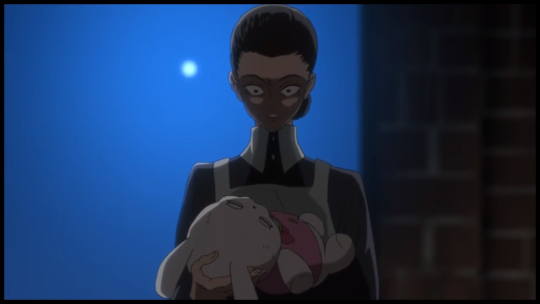
It was just the mixture of cold rage and subdued panic on her face when she was staring down at Connie’s stuffed toy, and realising the implications of what that meant… It was just downright chilling.
Similarly, the way Isabella looked at Emma as she was confronting her during episode 2 had a similar effect - It’s like she was piercing a hole straight through Emma’s very soul with that frightening glare:
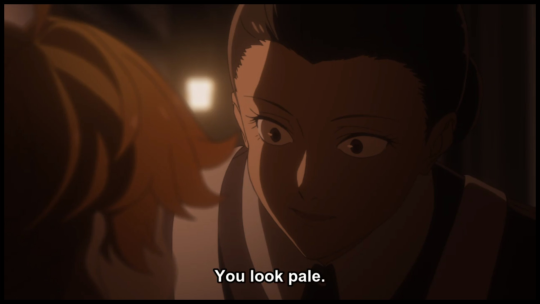
However, I’d argue that Isabella is actually collectively more scary when she is her normal, smiley self. Whenever she acts oblivious and puts on the caring Mama facade, even her warmest and most caring actions always seemed to have an underlying feeling of superiority to them, like she had the children in the palm of her hand. This ensured that whenever Isabella was even mentioned, the scene was immediately given a sense of uneasiness, and that is a very special quality to have; her character was powerful, because even when things seemed to be going according to plan for the main trio, you just couldn’t help but think that Isabella knew more than she was letting on.
To further reiterate how menacing she could be even when all smiles, are the multiple instances in which she demonstrates just how capable and dangerous she can be. One of the prime examples was when she somehow managed to become even more terrifying by orchestrating her own backup’s death:
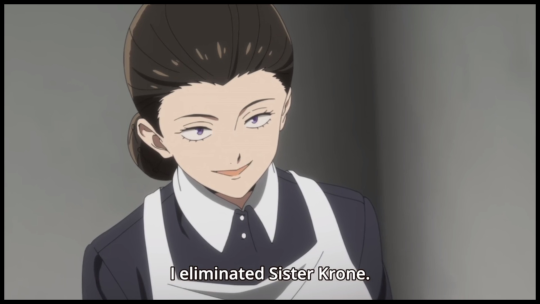
This scene, as well as everything that came immediately after it during episode 8, really revealed just how far ahead Isabella truly was. We learned the full scope of what she knew - Sister Krone’s plotting, Ray’s treachery, Don and Gilda’s involvement and even the most minute details of their plans of escape, Isabella knew. This really emphasised that aura of untouchable confidence which just screamed “you can’t win” that I had mentioned earlier, and it was this revelation that initially brought on the feelings of futility, because from this point onward, it started to become agonisingly clear that every solution the kids could possibly formulate would only led to dead ends because Isabella would seemingly always be three steps ahead.
Just look at how she side-eyes Don and Gilda as she passes them with that trademark knowing grin of hers:
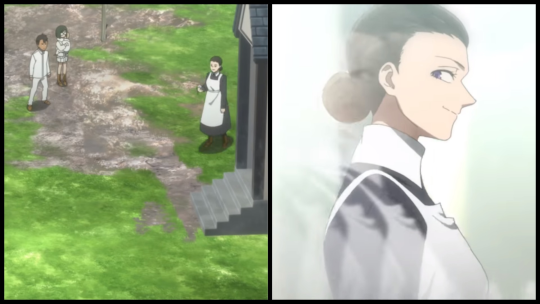
With that one look, she instantly set the kids back to square one, because every advantage they thought they had, they never really had in the first place.
Yet, I’d say the thing which made episode 8 truly great was how it managed to shed light on Isabella’s true nature. She adopts warm and motherly mannerisms when with the kids, but when she’s with Ray or alone, she is very distant and cunning. But when she confronted Emma and Norman for the first time “without the acting”, she revealed her true incentive for being a Mama - Love:
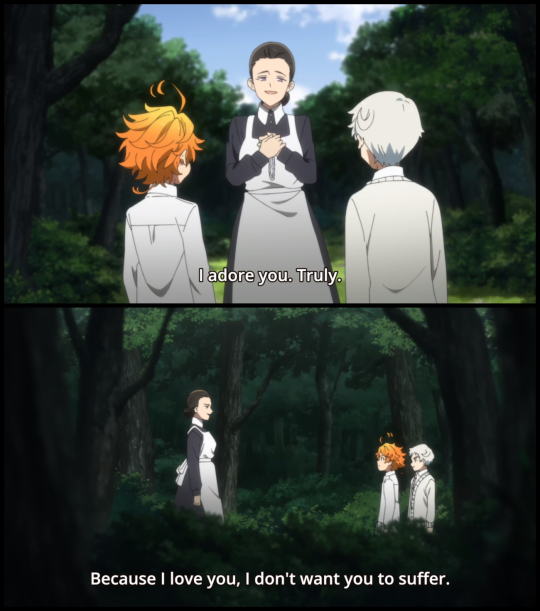
A very twisted love, but in her mind, a genuine and authentic love for the children, because due to her own experiences with being a child in one of the farms, she reached the conclusion that escape was impossible. So rather then fight what she deemed to be inevitable, she instead opted to ensure that the children would at least be able to live happy lives until they were eventually shipped out. This endeavour of her’s was genuine, and it just added to Isabella’s mystique because she would demonstrate mere moments later the extreme lengths she would go to in order protect them from their own idealistic fantasies, as she proceeded to nonchalantly break Emma’s leg, and would then comfort her as if nothing had just transpired:
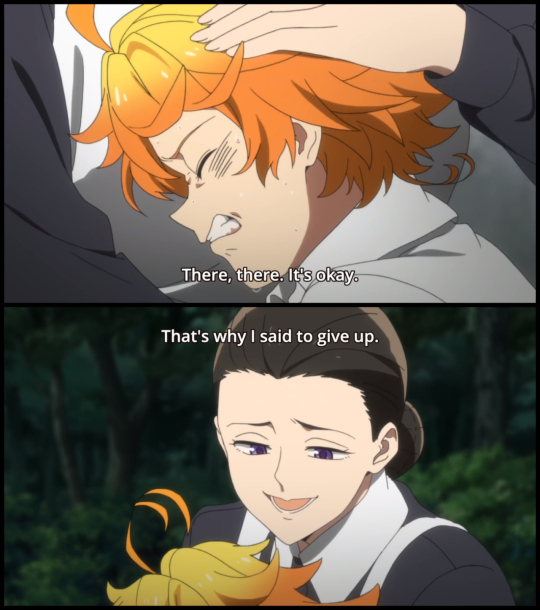
That, is terrifying - This love that she harboured for the children would lead her to lie to them, manipulate them, and physically injure them all for the sake of their own “protection”. This love of hers was the kind of love that would lead her to cradle Emma with a broken leg in her arms, lavishing her with love and attentiveness, as if she hadn’t just broken it herself seconds earlier with minimal effort.
In my opinion, that is far more terrifying than any expression she could wear, or the cold and calculated persona that she adopted when with Ray or alone, because her method of controlling them and imposing her dominance through her love, made the angle so much more psychological, and when Isabella visited Emma shortly after Norman was shipped out, she had this very telling expression and demeanour; It was almost as if she was saying “I told you so”:
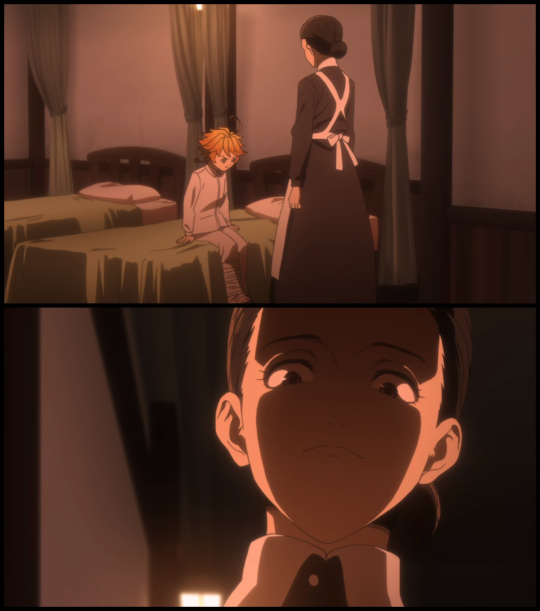
This is important because as mentioned earlier, Isabella has first hand experience with being a child in these farms, so a large part of her perpetual confidence in the futility of the children’s aspirations lies in her ability to predict the outcome of their efforts based on her own struggles all those years ago.
However, despite her outward aura of invincibility, there were one or two occasions where chinks in her armour were revealed. As she was escorting Norman to the gates to be shipped out, the latter asked her if she was truly happy, a question which although brief, appeared to have rattled her immensely:
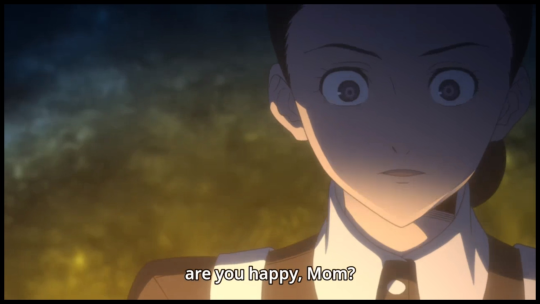
I feel that this scene is a lot more significant than it’s often given credit for. Up until this point, Isabella had forgotten what actual love and happiness felt like; She only had in her mind the type of “love” that had been shown to her following her escape attempts, and as she was preparing to become a Mama. Therefore, it stands to reason that her manner of showing love to the children as discussed above may very well be the only type of love she could remember.
However, Norman’s question shook her, because for a brief moment, she asked herself that question, and realised that something was missing. This is key to what makes Isabella a sympathetic character, despite the horrible things that she had done over the course of the series and her severely warped mindset. Through the flashback in the final episode, we see what she was like during her youth, and the many parallels with Emma were unquestionable:

We understand how she became what she is currently, why she ultimately submitted to the Grandma of her time and started training to become a future Mama, and what motivated her to become such a valuable asset to the organisation. It’s like Isabella can really be herself when taking care of the children, even the ones who had no future. This wasn’t solely a means of survival to her - She did genuinely love the time that she spent taking care of them, and that’s part of what made her so successful. An authentic love for what you do always leads to a better performance.
Additionally, when it was revealed that Ray was her actual biological son, it made it easier to understand why they had the relationship that they did. When Isabella first learned about it, she displayed a level of vulnerability that was so uncharacteristic of anything we had seen from her adult self thus far:
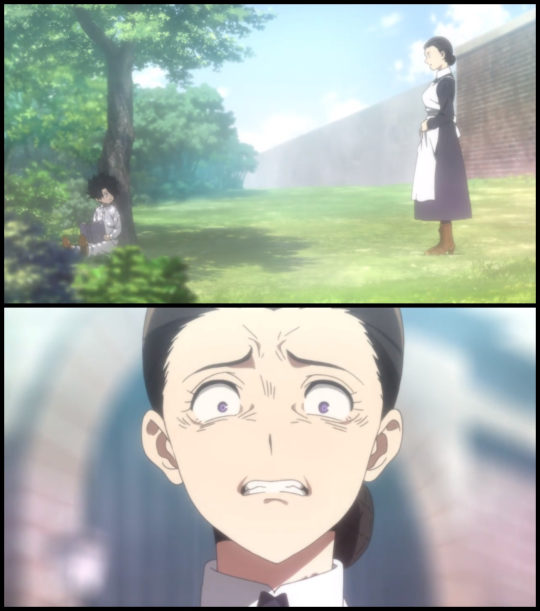
And made it nigh impossible not to feel at least the slightest bit of sympathy for her, especially when considering the tragic origins of the melody Ray was humming. Leslie was Isabella’s closest friend as a child; she may have even loved him, but she could do nothing to prevent his departure. Thus, as she was alone, her subsequent attempts at escaping failed, and she ultimately gave in.
Isabella is a representation of what Emma could have become, had she not had the help of Norman, Ray and everyone else, and that just perpetuates the notion that at heart, Isabella is indeed a good person who is just making the most out of a truly morbid situation. However, that’s not to say that she is blameless. Isabella is definitely a victim, but she is not innocent. By accepting the Grandma’s proposition, she made the selfish decision to prolong her own survival at the expense of the other children, but her decision was understandable.
Ultimately though, when the children actually did manage to escape against all odds, Isabella lost the will to oppose them any further:
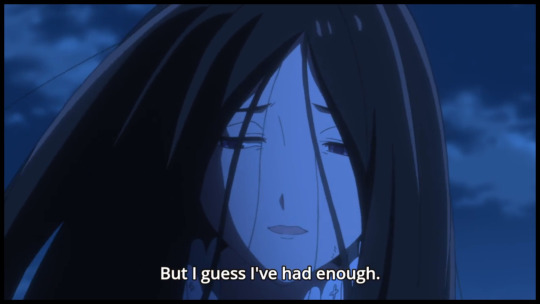
Because her desire to protect them from their attempts of escaping was only because she firmly believed escape to be impossible. Going back to the conversation she had with Emma during episode 10, Isabella reiterated what she had told the children during episode 8 - How she wanted them to give up because she truly believed that their efforts would only lead them to more suffering and despair due to its futility, and she didn’t want them to suffer:
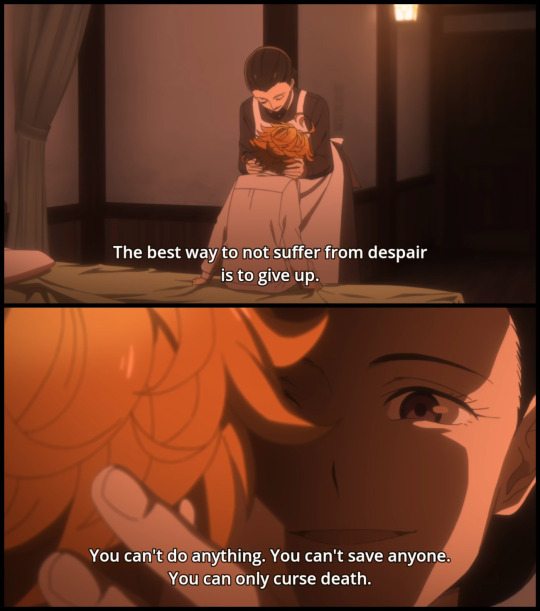
She echoed to Emma the thoughts that crossed her mind when she eventually made the decision to become a Mama - To simply accept the grim situation that she was living in, to free herself from the suffering that would inevitably come should she persist in resisting, and to make the most of the opportunity that was offered to her by doing what she could to survive:
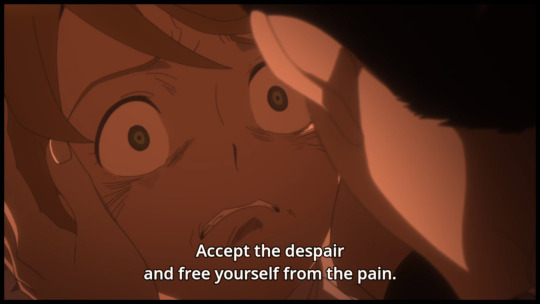
So she just didn’t want the children to keep hurting themselves by dreaming of things that would never come true. Obviously, they proved her wrong, and did so by having the utmost faith in their peers. The system only felt inescapable to Isabella because she faced it alone, a sentiment which she herself explicitly alluded to during her conversation with Emma:
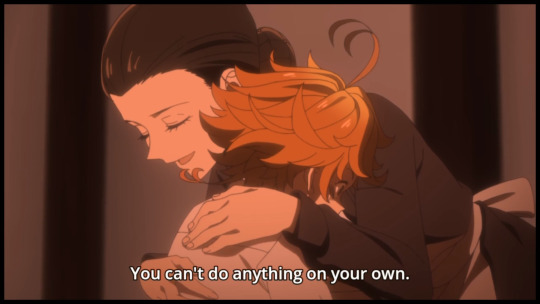
So when Emma ultimately still refused to give up on trying to escape, even after all the setbacks they had experienced including her broken leg and Norman’s apparent death, Isabella would admonish her for her foolishness and take her leave, but not before turning back and giving Emma a look of genuine sorrow:
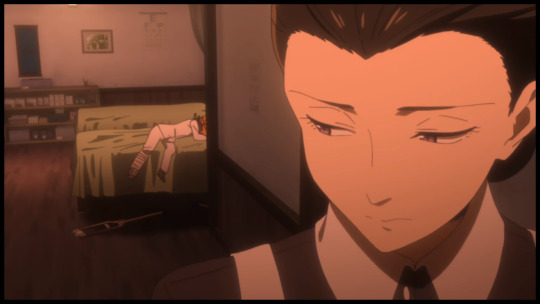
Because Isabella knew it too - Emma is just like she was in her youth, so she couldn’t help but feel a large sense of empathy for Emma because she knew exactly what she was currently going through. However, as Isabella was witnessing the children escaping, doing what she had agonisingly failed to do all those years ago, you could tell that she was genuinely pleased for them as she wished them all the best.
The shot of her waving goodbye to them as she prayed for their success in particular really tugged at my heartstrings, because it just illustrated how much she really did care about them, and how much in her own twisted way, she really was just trying to protect them, that much was now certain:
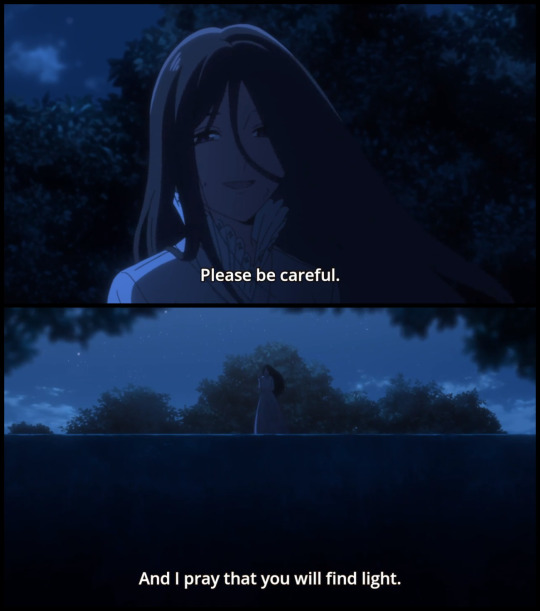
And afterwards, she would return to Phil and tell him not to worry because they had all escaped safely, thereby not only once again illustrating how far ahead Isabella always is because she already knew that Phil was aware of the truth, but also emphasising the authenticity of her affection for them. As mentioned earlier, Isabella finds a real purpose in nurturing all of the children, and this final shot of her taking care of the younger ones who remained really exemplified this:
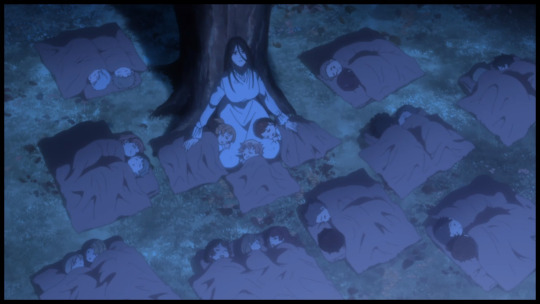
Here, she’s allowed to be her genuine self, doing what she genuinely loves for people who she genuinely loves, and it was very nice to see Isabella with her hair down (both literally and figuratively). Especially when considering that her future is now surely going to be in question. So due to this, it was all the more heartwarming to know that if her days were indeed numbered, Isabella would at least be spending them without the worry and stress of expectation on her shoulders. Seeing the contrast of how she was portrayed at the beginning of the series to her portrayal at its conclusion, and witnessing the journey she took to get from one point to the other was truly enthralling; No other character from the Winter Season gripped me quite like Isabella did, and that’s why she’s at the top.
284 notes
·
View notes
Text
~ Being British in Bavaria ~
Prologue
‘So, let's just get this straight,’ begins Frau Gürtelmann, removing her spectacles and fixing me slap bang in the eyes with a studied, concentrated gaze.
‘In your application you said that you are PC literate, but it turns out you can't touch-type, you can't tell the difference between pdf and power point, and Frau Bichlbächer had to show you how to send her an email’.
That much is true. I had needed to ask her secretary how to send an email. It seems incredible that a means of communication which we take for granted nowadays was by no means bread-and-butter business back in 1998.
‘All you're able to do,’ continues Gürtelmann, ‘is open Word’.Looking for confirmation, lest she might have misidentified my true colours, she cocks her head: ‘Right so?’
I’d been tickled pink when, having just graduated the previous autumn, Deutsche Telekom instantly offered me a full-time position in its translating department. My first day on the job looked promising. I’d always considered myself to be a natural talent at journalism, and was delighted to be asked to translate press releases for the company’s English-language website. The first assignment involved a dispatch advertising a wake-up call service from glamour girl Verona Feldbusch. That’s roughly the German equivalent of Katie Price. As I handed my polished text to the department secretary I remarked ‘Gosh, and there are people prepared to pay good money for something like that’.
This off-hand remark must have found its way back to the boss, because the following morning I was removed from press translation and relegated to manning ‘the clippings cubicle’. This, I soon discovered, was the least popular duty in the whole department – one normally assigned to school pupils on work week. My instructions were to ‘fillet’ the daily Fachpresse, or specialist press, cut out everything to do with telecommunications and glue it into a scrapbook. I’d heard from former novices that new full-time entrants were also occasionally put to work on this peripheral assignment. But for just a day or two, before being moved on to more key, translation-based tasks. Apart from being released to translate the odd text whenever a colleague went sick, I remained in the newspaper clippings cubicle a whole month.
I should have taken the hint. Especially when the colleague responsible for keeping an eye on my efforts quietly handed me the Stellenangebote – situations vacant – from the Süddeutsche Zeitung and suggested I might start applying for other jobs. Things hadn't quite panned out as planned, it seemed. I was now being called into the boss's office for my first and, as it soon transpired, only progress report. And we weren’t even a third of the way into probationary period.
Frau Gürtelmann's damning appraisal of my practically non-existent PC skills is, alas, spot on. Humiliated and unable to return her gaze, I lower my eyes, bringing them to rest on a stain on the lacquered wood floorboards. Then, as if attempting to mitigate charges being brought against me, I look up and whimper ‘Yes, but I also copy and paste’.
On reflection, I'd possibly taken ‘PC literate’, buzzword of the time, rather too literally. I was, after all, literate and able to turn on a PC. Surely that sufficed, did it not? A simplistic but nonetheless reasonable line of thought in the days when social networking meant little more than writing out a cheque each year for Friends Reunited and mobile phones came bricklike, glued to a 12-inch antenna. As for connectivity and the Internet of Things, back in 1998 these were foreign words to me.
In my defence, I ought to explain that my ignorance of all things IT was not totally mea culpa. I am one of the so-called ‘lost generation’. The very year after I left school, Information Technology was introduced to the National Curriculum. The idea of ‘catching up’ on this essential life-skills subject was never mooted, however. Right through university and well into my first full-time teaching job in Britain it was not once suggested that a basic grasp of PC knowhow might possibly enhance my career prospects. Not even when I took my Diploma of Translating shortly before the Millennium was there any talk of computer literacy being de rigueur for those wishing to progress in this IT-driven profession. As a mature student, I was easily ten years older than most of my fellow peers – every single one of them PC literate, naturally.
Following the dressing down in Frau Gürtelmann’s office, I knuckle down at my laptop and endeavour to fix my shortcomings in the IT department. For starters, I take an Introduction to Word course at the local VHS, part of Germany’s excellent adult education network. I even buy an old typewriter for ten marks and teach myself touch-typing. Still, having made a dog’s dinner of my first job in Germany, probably the most sensible thing to do would right now would be to cut my losses and return to England. Although my first attempt at teaching in Britain hadn’t exactly been a crowning achievement, I probably should consider giving it another go. They’re desperately short of foreign language teachers in Britain, I speak French and German fluently and am appropriately qualified. I feel sure I could make a much better job of it second time round.
So why am I reluctant to return to Britain? More to the point, why am I so gung-ho on staying on here and making Germany my home? Twenty years later, and this is still one of the most frequent questions which Germans ask me. ‘Wie kommst Du hierher?’ They want to know what brought me here. This has always struck me as something of a strange question. I mean, why not ‘Lust auf Lovely Germany?’ That’s the title of a recent Spiegel magazine report on intra-EU migrants. It’s no accident that some 96,000 Brits currently live in Germany. The country enjoys a healthy economy, plenty jobs, a generous health and social care system and generally a much better climate than Britain. They brew a damn good beer here too, of course. These are typical reasons I give whenever Germans ask me how I ended up here. And they’re all part of the reason why I’m so happy to make this country my adopted home. What originally attracted me over here all those years ago, however, takes a little more explaining. Truth told, I fell in love with Germany quite by accident. And it was all thanks to a teenage magazine called Bravo.
Flashback to the early eighties. Growing up in the genteel Georgian city of Bath in Northeast Somerset, it’s unlikely that I would ever have become quite so fixated with Germany and the Germans, had it not been for Bravo. I discovered this popular youth magazine on an exchange trip to our partner town of Brunswick in 1982. It was the year that Deutsche Welle rocked not only the German charts. Splashed over the mag’s front page almost every week were names like Spider Murphy Gang, Hubert Kah and Trio. The latter even made it onto Top of the Pops in Britain.
Emailing, text messaging, WotsApping – none of all that had been invented back then. I don’t think we even had fax. Which is why letter writing, just shortly behind the telephone, was probably the most common form of communication between young people. And Bravo, like most youth magazines of the time, played a pivotal role in this process. I decided to write off to its pen pal page. Scribbled on the back of a blank postcard and accompanied by a simple black-and-white passport photo, my text read Engländer (18) sucht nette deutsche Brieffreunde/innen (Englishman seeks nice German penfriends, male or female).
I didn’t give the request a moment’s more thought until several weeks later when the postman rang our doorbell excitedly waving a fistful of letters from Germany and Austria. The senders were all female, aged 15 to 17 – a rather narrow target audience for any type of magazine. Not that this really mattered much to me at the time, of course. I was too busy sniffing scented envelopes, deliberating which one to open first. Up to 900 further letters flooded in over the course of the ensuing months, and for a brief period I even possessed my own sorting bag at the local town post office. I did my uttermost to reply to as many as I could. My sole precondition – acceptance criteria, so to speak – was that they enclose a pretty photo. Or at least promise to send one by return of post. Scented notepaper earned bonus points, sending me onto overdrive, as I fired off responses machine-gun style. If ever there was a schoolboy trailblazer to online dating I can proudly say I helped pioneer the project. And if letter writing was ‘in’ then I was right there at the cutting edge.
It soon transpired that this was a perhaps less than ideal way to be spending almost every moment of my freetime in my final year of school. And scribbling away in chaotic Denglish was possibly not the best preparation for my German exams either. Miraculously, I scraped through final examinations with a ‘B’ (History) and two ‘C’ grades (French and German). The latter, interestingly, was a very hard school subject in those days, and remains equally so. This might explain my rather disappointing grade in my most favourite subject. Only around 9% of British pupils actually learn German – and most happily abandon the subject by the age of 16. No wonder Brits refer to it as ‘niche’ subject. Whatever educational value I felt might be derived from corresponding with a substantial proportion of the female teenage population in Germany obviously failed to manifest itself in my exam results.
Having written as many letters as I could physically manage each night I would crawl into bed, collapsing alongside my plastic-clad transistor radio. I habitually sent myself to sleep with Berichte von heute, North German Radio's roundup of the day's news. How much I was able to follow invariably depended on the strength of the crackly short-wave signal. Each morning I would awaken to dulcet tones of Radio Luxemburg's Fröhlicher Wecker, aka Axel Fitzke. This slightly less cocky German version of the BBC's Chris Evans invited his Germany-based listeners, and probably his sole follower in the UK, to wallow in a grand pêle-mêle of Deutsche Schlager and Euro pop. The latter – smash hits from Brittany to Bucharest – despite being sung in relatively comprehensible, albeit rather nonsensical English, never seemed to chart in Britain, strangely enough. The line-up included stars with dubious-sounding names such as Gazebo, Secret Service and Joy. Not to be confused, of course, with the somewhat more sophisticated Police and Joy Division, which most of my peers were into back then. But if Germans were unashamed fans of banal euro pop then it was good enough for me too.
In my last year of school I was, needless to say, obsessed with all things German. When classmates were kicking a ball around the playground or, more likely, slouched on sofas in the sixth form centre, my ears would be glued to headphones in the language lab, fervently following the latest episode of BBC Schools' Deutsch für die Oberstufe, which Herr Lawson kindly recorded each week just for me – I seemed to be the only one interested.
Hence I spent my final school year specialising in the subjects I loved – foreign languages and history. The school careers advice centre, sadly, wasn’t the greatest of help in guiding me on what exactly to do with these subjects after school. Looking back, I should really have gone in for something more career-oriented, such as journalism or tourism management. Unsure what to do next, I was talked into doing a bone-dry, text-bookish Language and Linguistics degree course. I chose the University of Essex for one sole reason – the port of Harwich was just down the road, providing a convenient escape route to Germany. It was a few more years until no-frills airlines were to revolutionise the way we travelled abroad. For the time being it was the ferry for me.
Had you asked me, in those halcyon, pre-Brexit days, if I'd rather be German than British the answer would have been a resounding ‘Jaaaa!
This, then, is the story of my journey from Bath to deepest Lower Bavaria. And in this post-Brexit climate, an attempt to answer perhaps one of the toughest Anglo-German issues:
Can you really transform a Brit into a Bavarian?
0 notes